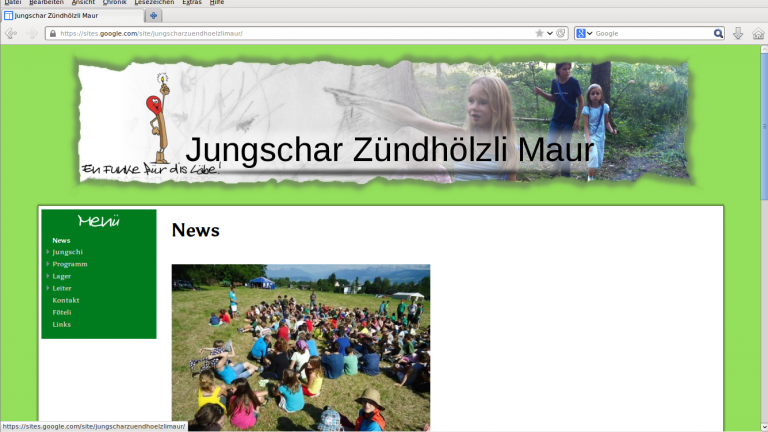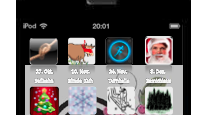In the digital age, a web presence for one's group is almost indispensable. Many churches already have a website. If there is the possibility to present there all the important information of your Jungschar, this offers itself, because this is free of charge for you. However, it is not always possible to present your youth group there to the necessary extent
Wenn es die Möglichkeit gibt, dort alle wichtigen Informationen eurer Jungschar zu präsentieren, bietet sich das an, da dies Kostenlos für euch ist. Jedoch ist es nicht immer möglich, seine Jungschar dort im nötigen Umfang zu Präsentieren.
Prerequisites
For a website, a server is necessary on which the website runs. You can rent these servers from companies to run your website on. However, this comes with a monthly fee. Also the domain (the address www.js-irgendwo.ch) is liable to pay costs. Depending on the service you want, of course, the prices vary.
A website - hosting (ie a web server) is already from 4 Fr. per month to have. The dienstleistungen differ of course depending on the provider quite strongly. Therefore, a thorough review of the provider by means of Internet research should always be considered. A personal suggestion is Hoststar ( about 6 Fr. per month, and everything you need).
The domain is very cheap, as it costs only 17 Fr. per year (as long as you rent a .ch - domain). This can either be ordered yourself at www.switch.ch (the official domain registry of Switzerland) or directly in the hosting.
A website with Joomla 3.x
Joomla is a CMS - that is, a content management system. This program, when installed on a hosting, offers a versatile user interface in the backend, which can be used to manage a website.
The frontend is what the normal internet visitor sees, so the actual website, the backend is the administrator's area where you can manage the whole website down to the smallest detail.
For Joomla you need a hosting (with a MySQL - database support!) As well as a domain and of course the Joomla itself. Joomla can be downloaded for free from their website (always take the latest version).
This variant of the website knows no limit, you can do ANYTHING. For Joomla there are numerous extensions for every area of use. The only condition is that you fully commit to this subject area - it takes a lot of time and motivation!
CAUTION: Joomla is a very extensive and complex CMS. Due to the high functionality, it is confusing for newcomers and therefore rather unsuitable.

A website with WordPress
WordPress like Joomla, is a CMS (Very important, WordPress.org, not WordPress.com). WordPress is the most widely used program to create websites. The advantage of it is that there are a lot of free templates and extensions for your website. There are also many tutorials for WordPress. You can also achieve a lot in terms of design and formatting with the new editor.
The big advantage is also a disadvantage, because many features that almost every website and every other CMS has from the beginning, such as an image gallery are not available by default and you have to add a lot with extensions. This leads to the fact that the website loads slower.
Also for WordPress you need a hosting and a domain, but the program itself can then often be installed with a few clicks and is free. Compared to Joomla, WordPress is designed more for beginners and is less complex. Because of the fact that many hosters nowadays offer a simple interface, WordPress is suitable for young groups, in which no one really knows the matter well.
A website with Pagekit
Pagekit, like Joomla, is a CMS. It is a very new and modern framework - it combines various concepts from well-known CMS like Joomla, Drupal and Wordpress. Thus, it provides a simple and intuitive user interface.
It is super suitable for small to medium websites - offers a simple tool to manage the individual pages with HTML or MarkUp editor, simple user management, a clear file manager, as well as a blog.
The installation is incredibly simple - you do not even need an (external) MySQL database. So it can also be installed on various FreeHosting.
Because of the well thought out and clear programming of the framework, it is optimal for developers with (little) experience in PHP, HTML, CSS, Javascript. Custom layouts or even extensions for the CMS itself can be written quickly.
Pagekit -- Docs -- Extensions -- Download
Note: Pagekit was developed by a German company (Yootheme), however the whole Pagekit site is in English! However, the CMS itself has a German language pack.
I tried Joomla, Wordpress and finally Pagekit for the Jungschar EK website (www.jungschar-ek.ch) - I am thrilled :D !
Alternatives
There are many offers where you can create a website without hosting. Most of the time, such "free websites" offer few options in terms of usage and expansion. Important to know: You never get your own domain for free, with these free sites the created website is called either mywebsite.providerofwebsite.ch or provider.ch/.../mywebsite. Some are presented here:
Wix - free website builder
Here you can easily build your own website. The website - builder is top notch and offers many features. But the whole thing has a catch: The cost. One has created a website incredibly quickly and easily, but this does not run on its own domain, as well as one must struggle with advertising on your own homepage.
To stop all this, one must pay at least 8 dollars a month, with little storage space and low bandwidth. Only with $12 a month do you have reasonably good hosting.
This is much more expensive compared to hosting your own - but the overhead also has to be considered, and it's not very big for a website with Wix.com. Either a lot of effort, but less cost or little effort and more cost?!
Google Sites
Google, however, has an offer that is completely free. What's more, it doesn't require any programming skills. All you need is a Gmail account, which you can register with for free.
Once you have such an account, you can go to Google Sites and create your first website.
Here is an example of such a website:
Possibilities with Google Sites
- Create a web page with text, images, and tables
- Creating links to other web pages
- Linking to a Google Calendar for program data
- Offer documents, images, presentations, or movies for download via Google Drive (for programs, parent info, or camp movies)
- Link photo album via Google+ or Picasa
- Link YouTube movies
- Draw locations on Google Maps
- Create registration forms (for online camp registration)
By signing in with a Gmail account, you also have access to many of Google's other services, such as:
- YouTube
- Google Kallender
- Google Maps
- Google Drive for files (similar to Drop Box)
- Picasa for photos
These can be easily embedded on the website afterwards.
Image credits
- Title photo: Jungschar Zündhölzli Maur, www.jsmaur.ch
Content may be automatically translated. Help improve the quality of the translation with your editing!



